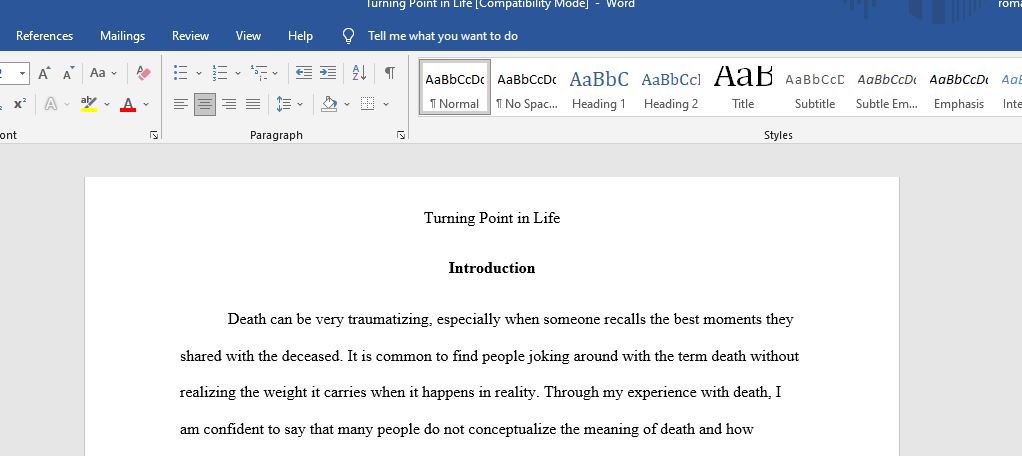Write an English Narrative Essay.
Assignment One – Descriptive / Narrative Essay
Purpose:
The main goal for this paper is to develop skills in supporting a thesis or general assertion with evidence and specific details. This paper will allow you to draw on your own experience and to use that experience to illustrate the merits of your own opinion. In order to do so, the paper must have a working thesis (an assertion or claim followed by a reason or supporting phrase), and real details that come from an experience or experiences of your own. The way to develop those details involves working with descriptive and narrative methods of writing.
For this essay, the purpose will be to use descriptive methods to develop and support your topic and your thesis. Consult your OER materials that cover description for avenues to use in your descriptive writing. Remember, descriptive writing must appeal to the senses, use figurative language, include associations by using similes and metaphors, and appeal to an audience that can be recognized. Also, your descriptions should be focused on an idea that you want your readers to relate to and consider. Furthermore, descriptive writing avoids simply informing your readers what you think they need to know. Instead, it shows them.
Format:
A three page paper is required. If the paper falls short of three full pages, it may be considered as incomplete or failure to meet the minimum requirements of the assignment. A significant amount less than this minimum will be considered as incomplete and could reduce the grade to lower than a C. Type your essay using 12-point font. Use Times New Roman. Double-space your essay or it may not be accepted for grading.
Submit your final draft for grading on Blackboard. Click on the Essay One icon, load your final draft onto the submission page. Submit your work as a .doc or .rtf. Your paper will be loaded as an MS Word document and given comments on the side. It will be returned as a .doc. If your paper is not loaded as a .doc or .rtf, then it may not be accessible for comments, and you may have to resubmit it given instructions for how to do so.
Suggestions:
Use your introductory paragraph to set up the paper. Build up interest in the topic with details. Lead to the thesis statement. Provide one main thesis statement at the end of paragraph one.
Design main body paragraphs to develop the ideas from the main thesis. Give each paragraph its own main topic as if it has its own thesis statement. The topics should be more specific terms to define the main ones in the main thesis. Provide detailed evidence in each paragraph to show how you know what your paragraph claims. Lead to a paragraph conclusion.
Base your evidence examples in your paper on first-hand experience. Make sure that the details in your paragraphs are vivid and that they come from a real and specific incident. You can write it using the first-person point of view (using I, me, we) when you refer to your experiences as long as you remember to connect your examples to your general thesis clearly. In the general thesis statements, it’s best to keep the first person pronouns out.
Connect each paragraph to a main idea from the thesis. Design paragraph topics and conclusions to make the connections. After the main topic, transition into the supporting details. Give your details vivid descriptions so that your audience can relate to them. After the evidence is demonstrated, transition into the paragraph conclusion. The paragraph’s conclusion should be the result of the evidence. Your last paragraph should be the final argument, the main point of the thesis that is the result of the exploration of all of the evidence.
Use descriptive methods to make your reader “see” the experience or experiences in each paragraph. The examples you include in your paper should be used as evidence to support your general opinion. Remember to give this experience a sense of place or establish necessary background information, and remember to establish your authority on the topic and evidence. Who are you? When did the experience happen? This experience should hold a high degree of significance for you, which you can use to enhance your descriptive detail.
Some things to ask yourself so that the details can be used more effectively to support a general opinion: How has this experience influenced you? How does it relate to us, your readers? Should it affect people in the same way? How and why?
I will be looking for clarity, organization, and the use of descriptive methods. Each paragraph should be focused on one point that stems from and relates to your central idea. For instance, if I were to write a paper describing the crazy and deadly bus rides I have experienced in Austin, I might focus my central idea on an argument for training Austin Metro drivers more efficiently.

